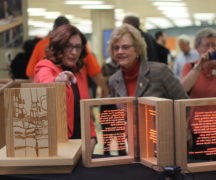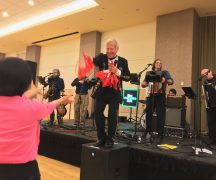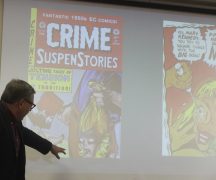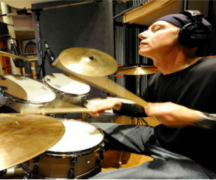By DAVID DUPONT
BG Independent News
Though Alex Meixner has degrees in jazz and classical trumpet performance from Ithaca College and Penn State, accordion is the instrument that’s closest to his heart and polka is the music he’s devoted to performing.
Meixner will visit Bowling Green State University Sunday, Dec. 9, for A Celebration of Polish-American Polka, from 5 to 9 p.m. in the Lenhart Grand Ballroom in Bowen-Thompson Student Union.
Tickets are $25 for dinner and music and $10 for BGSU students.
The university libraries has what may be the largest collection of polka sheet music in the world, Meixner said.
That’s thanks to BGSU grad Steve Harris who two years ago donated the library of the Vitak-Elsnic company to the library. Meixner is adding to the stash with a donation of his library.
Meixner, who turns 42 the day before the BGSU event, can trace his ties to polka back three generations.
His love of music started early. Growing up in the Austrian enclave of Copley, Pennsylvania, he was surrounded by ethnic sounds. His father, who was born in the US but taken care of by his grandparents, didn’t speak English until he was 5.
The Austrians were just one of several ethnic groups from central and Eastern Europe to populate the area, and each had its particular twist on polka music.
While Meixner was surrounded by music he was never pushed to play. Not that his parents could have stopped him.
“I was never forced to do this,” he said in a recent telephone interview. “I’d drum on anything, from the kitchen table or myself. I was just following in my father’s footsteps and my grandfather’s as well. It resonates with me,” he said.
“I’ve been really blessed to have had the opportunity to study and perform in so many different contexts. There’s just something about that 2/4 beat of the polka that created its own heartbeat for me.”
At 3, he started piano lessons, before moving to accordion. By the time he was 6 he was on stage, and hasn’t left since.
A track he recorded with his father was included on a Grammy-winning album. He collaborated with Jack Black on the soundtrack for the movie “The Polka King.” Jan Lewan, the subject of that film, will be a guest Sunday at BGSU.
To the extent Meixner made a name for himself, he said, it is for bringing a pop sensibility to polka by covering unlikely tunes by Lady Gaga and others. Still he is devoted to the tradition.
The continuum is evident in the musicians he’ll perform with in Bowling Green. They include guest vocalist Joe Oberaitis. Meixner’s father recorded with the singer. “My dad came home from that taping in time for me to be born,” Meixner said.
Jimmy Meyer, on guitar and banjo, started off playing with Meixner’s father. “We come from the same vibe.” Like Meixner, Meyer is skilled in other styles. “He’s a killer rock and blues guitarist.”
Meyer worked in industry, but kept up his music. He formed a company band that won top honors in a competition at the Rock ’n’ Roll Hall of Fame.
Others in Meixner’s group bring firm grounding in other genres to the music — drummer Tom Haller has classical and jazz background, fiddler Paddy King is rooted in the Irish and Americana traditions — this is his first polka gig, and saxophonist Chris Heslop has written operas and charts for jazz orchestra as well as working in gypsy jazz.
Meixner played with Frankie Yankovic late in the polka legend’s 70-year career. He saw first hand how “the personal relationship he developed with his audience was part of his staying power. … I pledge to do my best to have that authenticity of character and music.”
Maintaining that relationship with fans is all the more important in the age of social media, he said. That also helps fans keep in touch with others who share their love of polka.
Meixner is expert in the variety of polka styles, and finds each has its following depending on the region, whether Texas or Wisconsin. He sees an uptick in the number of kids picking up the accordion.
Sunday’s event is part of continuing the music’s tradition.
Vitak-Elsnic published music from the late 19th century until the 1970s. The company sold sheet music and orchestrations for salon orchestras for musicians who were performing Polish, Bohemian, and German polkas “but weren’t necessarily that themselves,” Meixner said.
Most of the source material for Meixner’s new recording “Polish Blood” comes from the 1920s and 1930s. The Sunday event will mark the release of the recording.
“We’ve formed a fellowship with Bowling Green,” he said. “Hopefully this will allow us not just to have further study of the manuscripts but to give the music its rightful respect in academic circles.”





